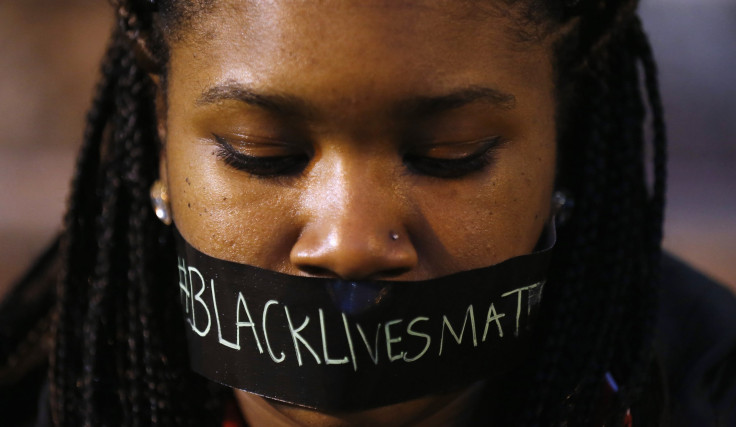Walter Scott Shooting: Why Do Black And White People Think Differently About Police-Involved Deaths?

Another death of an unarmed black man at the hands of a white police officer last week spurred renewed protests Wednesday against excessive police force. Walter Scott, a black South Carolina man, was fatally shot Saturday by a white cop in an incident captured on video.
Amid the debate about how to prevent such deaths in the future, a vocal minority on socially media -- mostly white conservatives -- claimed the death was justified because Scott had a criminal record and reportedly owned a Mercedes-Benz yet failed to pay child support. The reaction echoes similar backlashes against black suspects killed by white police officers in recent months and highlights the divide between how some whites and blacks think about police-involved deaths.
“What is most troubling for me is the way in which these shootings are being justified, both by police officers, police departments, public officials and everyday citizens. And the way in which the Twitterverse is becoming a medium for all of these people to articulate these really horrible things about black men,” said Rashad Shabazz, a geography professor at the University of Vermont who teaches courses on policing, urban life and mass incarceration. “We have to ask ourselves: ‘What kind of society [are we,] where a sizable portion of the population wantonly finds justification in the killing of unarmed people, and in what society is that OK?’”
Ex Coast Guard #WalterScott was shot in the back/killed by SCPD officer for a broken tail light #stoppolicebrutality pic.twitter.com/WcOnSUxUwR
- AMC (@Truthbuster) April 8, 2015The racial disparity on Twitter between those who saw the Scott shooting as another example of excessive use of police force against black men and those who viewed it as justified has been reflected in polling on other police-involved deaths in recent months. When a grand jury declined to indict former Ferguson, Missouri, police Officer Darren Wilson in the death of Michael Brown last year, 80 percent of blacks said the decision was wrong while only 23 percent of whites said they felt the same way, a Pew Research Center poll said in December. In the case of Eric Garner, an unarmed New York City man who died after being put in a chokehold by a white police officer, 90 percent of blacks said the grand jury’s decision in November not charge the officer was wrong while 47 percent of whites said so.
Whites and blacks perceived the role of race in such incidents differently. More than eight in 10 blacks said race was a factor in the Brown shooting, while only a third of whites said they believed race was a factor, the Pew poll found. In the Garner case, 80 percent of blacks said race played a role while only 34 percent of whites said Garner’s race was a factor.
Both Brown and Garner were portrayed by some police supporters as oversized thugs after their deaths because of their criminal histories and large frames.
Scott, 50, was shot in the back Saturday while fleeing from North Charleston, South Carolina, police Officer Michael Slager, 33. The video of the incident, which also includes what some observers said was the planting of Slager’s Taser on Scott’s person as the officer handcuffed the dying man, led to murder charges being filed against Slager on Tuesday. Scott had been arrested roughly 10 times in his life, mostly for not paying child support or failing to show up for court dates, the Charleston Post and Courier reported.
#WalterScott can't pay child support but can afford rims? Who cares he's dead
- Brianna 'exman' Wu (@barfbaron) April 8, 2015Making a list of reasons that don't justify a cop shooting you in the back, Chuck? #WalterScott https://t.co/w6ofxevPNf
- Rebecca K. (@Rebeksy) April 8, 2015He deserved to be shot for bolting those ridiculous wheels on his (stolen) Merc.... #WalterScott pic.twitter.com/COjsxqrsi4
- Count Spacula (@SpacsBack) April 8, 2015Racist stereotypes portraying blacks as criminals are partly to blame for the divergent views among blacks and whites on police-involved shootings and deaths, Shabazz said. “One of the major reasons why white people don’t acknowledge the role of race in these police shootings is that there is a belief that black people in general, and black men in particular, are prone to criminality and that very racist stereotype justifies the use of excessive force and, in the case of South Carolina, the murder of black men,” he said.
Whites and blacks also have different experiences with the roles of police in their communities, Shabazz said. Police regularly patrol in black neighborhoods, while most whites’ interactions with police typically involve officers helping a neighbor who locked keys inside their car or needs help rescuing a cat from a tree, he said.
“This continuity of that distinction between police being called in to serve a purpose in the neighborhood as opposed to police being a ubiquitous presence in the neighborhood creates a different perspective on the role of police and what police do,” Shabazz said.
© Copyright IBTimes 2024. All rights reserved.






















